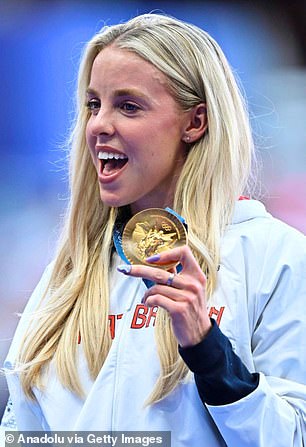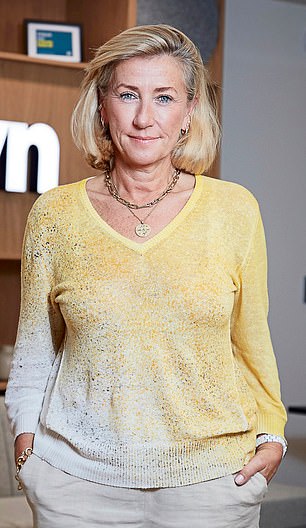Table of Contents
Winning formula: Vidler wants to leverage technology to attract younger players
Andria Vidler, the head of the National Lottery operator, has a message for women who want to follow in her footsteps and become chief executives: “It could be you.” Vidler, who grew up in an ordinary home in Tunbridge Wells, Kent, where her mother was a hairdresser and her father a cameraman, feels she has hit the jackpot of her career.
But like many high-achieving women, she admits she suffered from “impostor syndrome” in the past, before landing the top job at Allwyn UK, which took over running the lottery this year.
“I used imposter syndrome to my advantage. My advice to other women is to do the same. It pushed me to try harder and constantly challenge myself,” she says.
‘Women need to have confidence in their voices. Base what you say on data and evidence, learn to make a clear case, and stay calm even when you’re angry or want to cry.
“If you feel like crying, try whistling, as it is physically impossible to cry and try to whistle at the same time.”
Vidler doesn’t seem like the type to cry at work, but admits she has “gone to the bathroom to cry,” adding: “It was in male-dominated jobs that made life difficult for me. But it helped prepare me for the tougher challenges.”
Before the Lottery, Vidler worked in media and marketing. At the BBC, she helped launch Radio 5 Live and BBC News 24. Her other roles include a stint as chairman of EMI Music, when it was under the ill-fated ownership of Guy Hands, the private equity tycoon.
The common thread of her career is “reinvention.” She says that, like Madonna, organizations and individuals need to reinvent themselves in order to thrive.
“One of the challenges of the National Lottery is that it has aged,” he says. When it debuted 30 years ago in a television show hosted by Noel Edmonds, Anthea Turner and Gordon Kennedy, it was a national event watched by a third of the population.
As Vidler points out, that was a different time, with no smartphones and just four television channels. The live draw, which was a fixture on Saturday night television for more than 20 years, was discontinued in 2017.
The typical player – “a wealthy man between 45 and 50 years old” – is also getting older, so he wants to attract a younger audience.
“Do I think we need to look in the mirror, with all our flaws, and see how we can make the Lottery more attractive?” he asks. “Yes. The Lottery hasn’t been updated since 2009, which was the start of Camelot’s third licence. Back then, it was pre-iPad, pre-Instagram – you probably used a BlackBerry.”
Vidler says the lottery can attract younger players if it better communicates the benefits it brings to society. “My daughters’ generation, who are 20 years old, are interested in social impact. It’s not our responsibility to communicate where the money goes, but we would like to do more in that regard,” she says.
‘Out of every £50 lottery ticket, 56p goes to prizes, the Government gets 12p in tax, retailers get 5p, costs are 3p, good causes get 23p and we get 1p.’

Among her ideas are scratch-off Christmas cards that double as gift tags, as well as advent calendar-style cards. She also plans to use technology to appeal to young people.
“The app is a bit clunky right now. We need to get the technical infrastructure in place to create new games that generate that excitement.”
Artificial intelligence (AI) will transform the offering, he says. It could, for example, provide insights into how lottery money has been allocated to support causes that are of interest to a particular player.
“We are investing in new point-of-sale technology with a digital display that tells you which local projects have received Lottery grants,” says Vidler. “It’s thanks to AI that we can do this.”
Allwyn was licensed in March 2022 by Canadian company Camelot, which had been running the Lottery from the beginning.
It was a controversial and bitter decision. Critics pointed to the Russian links of Allwyn’s ultimate owner, Czech tycoon Karel Komarek, despite his strong denunciation of Putin’s war on Ukraine.

Funding: Lottery money has helped athletes like Olympic gold medal winner Keely Hodgkinson
Camelot filed a legal appeal against the ruling, which was dismissed after a bitter dispute.
Allwyn acquired its former rival in a merger that brought together two organizations that had been at odds with each other.
“It was like the Montagues merged with the Capulets,” says Vidler, referring to the warring clans in Shakespeare’s Romeo and Juliet.
The two sides came together, he says, working late into the night to close the deal, adding: “Everyone worked around the clock, there were pizza boxes and chocolate everywhere. From that point on, we were one team.”
“It was a tough environment back then, but so much has happened that it’s forgotten. It’s very intense therapy, there’s no time to do anything but get on with it.” There remains scepticism about whether Allwyn will hit its target of raising £38bn in ten years, while Camelot raised just £48bn in 30 years. Is this realistic?
“We can generate a lot if people gamble a little more without going overboard,” he says, adding that AI can identify people who gamble too much. Problem gambling in the lottery is not, he says, a big problem, “but we need to be vigilant.”
She says: “Our strategy is to get a lot of people to play a little bit. We are the seventh largest lottery in the world, but only 66th in terms of per capita spending.”
One of the Lottery’s great achievements is the way its funding has transformed Team GB’s performance at the Olympic Games.
It provided support to athletes such as Keely Hodgkinson, who won gold in the 800m race. At the 1996 Atlanta Games, Great Britain took home just one gold medal. Since Lottery funding began in 1997, the British team has won more than 1,000 Olympic and Paralympic medals.
She has also raised more than £50m for women’s football. Vidler cites the England women’s football team as an example: “The money donated to the grassroots helped create the Lionesses.”
A darker side of the Lottery is the so-called “curse,” when winners learn the hard way that money does not always bring happiness.
Stories of how big prizes ruined lives have existed since the 1960s, when football pools winner Viv Nicholson said she would “spend, spend, spend”. The Lottery has a team of advisers who provide specialist advice and support. Vidler wants to put more emphasis on games like Set For Life, where the prize is a monthly income rather than a lump sum.
She says: “If people earn £10,000 a month when they are 20, that won’t stop them from working, but it will enable them to travel or access housing. It’s a responsible product.”
She would like to bring back the sociability that used to accompany the lottery. People used to form groups of friends at work or in the bar, but this trend is on the decline.
“When the lottery was on TV, part of the fun was playing with others and watching it all together,” he says. “That’s been lost, but the connection is very important. We’d like to find ways to bring it back.”
DIY INVESTMENT PLATFORMS

AJ Bell

AJ Bell
Easy investment and ready-to-use portfolios

Hargreaves Lansdown

Hargreaves Lansdown
Free investment ideas and fund trading

interactive investor

interactive investor
Flat rate investing from £4.99 per month

Saxo

Saxo
Get £200 back in trading commissions

Trade 212

Trade 212
Free treatment and no commissions per account
Affiliate links: If you purchase a product This is Money may earn a commission. These offers are chosen by our editorial team as we believe they are worth highlighting. This does not affect our editorial independence.
Some links in this article may be affiliate links. If you click on them we may earn a small commission. This helps us fund This Is Money and keep it free to use. We do not write articles to promote products. We do not allow any commercial relationships to affect our editorial independence.


